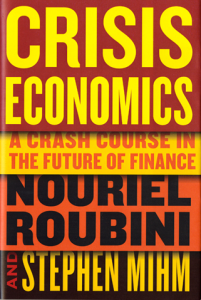 I am not an economist but part of my job is to explain to everyday investors how it all works — that is, when it does. Of late I have been reading a lot about the economic crisis because I am not convinced that the systemic weaknesses and abuses that led to it have been adequately reformed.
I am not an economist but part of my job is to explain to everyday investors how it all works — that is, when it does. Of late I have been reading a lot about the economic crisis because I am not convinced that the systemic weaknesses and abuses that led to it have been adequately reformed.
Subtitled “A crash course in the future of finance,” Crisis Economics concerns itself with the recent past in a way that will be valuable and useful for the future. Unlike Michael Lewis’s The Big Short, which told the story of the recent economic crisis through an anecdotal or even a moral/ethical lens, Roubini and Mihm’s book is more technical and focuses its attention on the challenging multiple problems of reform.
Opening with a sly dig at Nassim Nicholas Taleb’s Black Swan, the first chapter (“The White Swan”) sets up the premise that crises are an absolutely normal feature of capitalism — i.e., not the unforeseeable, crazily improbable black-swan events that afterward made so many commentators on CNBC rend their garments. Of course, Roubini’s fame is premised on his prediction of the crisis in 2006. Point taken.
Next up is a survey of crisis economists, including what I read as an unbegrudging respect for Karl Marx due to his visionary quality: “Marx was the first thinker to see capitalism as inherently unstable and prone to crisis.” This seems entirely reasonable — in just one generation, we have seen the S&L crisis, the tech bubble, and the subprime catastrophe, not to mention all the firm- and fraud-specific crises such as Long-Term Capital Management, Barings Bank, and Bernie Madoff, and the various currency and sovereign debt crises around the world. “Capitalism is crisis,” the authors conclude, nodding in agreement with Marx.
This sets up the middle of the book, a briskly told but amply detailed recent history of global financial self-destruction. Here the network of corroboration is established — subprime lenders, Fannie Mae and Freddie Mac, Treasury, the investment banks, the ratings agencies, the Fed — and how colossally they all let us down, despite our possibly having sidestepped an even worse disaster.
Roubini and Mihm have concrete ideas about what to do to prevent future disasters, distilling their prescription to these areas of reform (here highly oversimplified):
- Compensation. “The biggest problem with compensation is not the amount of money involved; it’s the way this compensation is structured and delivered.” Precisely. Any taxpayer understands in his bones that our financial system incentivizes the wrong short-term behavior — he knows because he just paid for it on an unprecedented scale. To remedy the onus of the banker’s bonus, a “bonus-malus” system is proposed, sort of a long-term “merit-demerit” system that makes infinitely more sense than the compensatory structures now in place.
- Securitization and ratings. Here the problem is twofold: the people who bundle toxic ingredients into massively leveraged securities, and the people who say those securities are safe. Shouldn’t chefs be forced to eat their own cooking? Shouldn’t food inspectors be obliged to eat food they have deemed safe?
- Derivatives. “The new generation of derivatives should be the subject of far more systemic and ruthless scrutiny by regulators.” Yes, but they are also not condemned here for the simple reason that they can be properly used to hedge risk. Emphasis on the word “proper.”
- Too Big to Fail. “By returning to a beefed-up version of Glass-Steagall… we can create a safer, saner financial system.” The reality proposed by Senator Phil Gramm, ex-chair of the Senate Banking Committee and economic adviser to John McCain, turned out to be false. Gramm was a free-market deregulatory fanatic: he was behind the dismantling of Glass-Steagall in 1999 and also managed to exempt credit default swaps (CDSs) and other “over-the-counter” derivatives from regulation in 2000. Eight years later, the notional value of CDSs peaked at $60 trillion — and the bubble popped. The giant institutions created in the wake of the dismantling of Glass-Steagall are genetically programmed to survive, thus requiring the churning of ever more toxic assets and the taking of ever more gigantic risks and receiving ever greater taxpayer-funded bailouts as a routine fact of survival. (Thanks, Phil, for helping to destroy the global financial system.)
Plenty of other topics are also covered in detail here: Greenspan’s hand in the matter, the decline of the dollar, the significance of emerging markets.
One of the most appealing aspects of the book is its level-headedness. It is easy to say derivatives are evil, or that securitization should be abolished, or that all compensation should be capped particularly after a multibillion dollar bailout. Roubini and Mihm stay on point and recognize that leverage and securitization and massive incentives are all potentially powerful tools for “good” capitalism.
The decision-makers of Wall Street apparently never saw the movie Spider-man: “With great power comes great responsibility.” Therefore, because Peter Parker is not here to oversee our financial system, we need regulations and we need regulators — powerful regulators who deserve not to be demonized and who “can be compensated in a manner befitting the key role they play in safeguarding our financial security.” When great fortunes are at stake, self-regulation has never worked. The Gramm Goblin could not have been more wrong.
REPORT CARD: A+
Leave a Reply